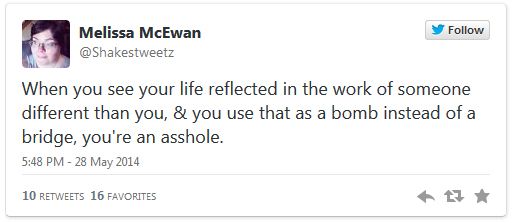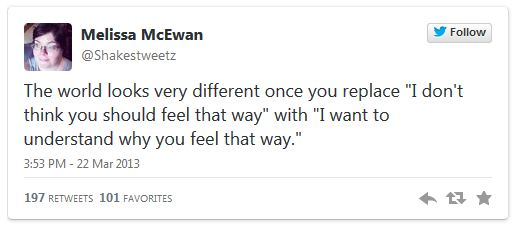
Above is a tweet I published the day Maya Angelou died, after seeing a bunch of white women police black women's reactions to losing a prominent black female scholar and lecture black women that Maya Angelou's work was "universal," so valuing her specifically as a black woman is somehow wrong.
This is something white women do a lot to black women. It's something that members of privileged groups of people do to members of marginalized groups of people all the time, "What about the men?" being an easily recognized variation (which lots of white feminists inexplicably don't reverse engineer to apply to their own demands to have their concerns centered). It's something that members of one marginalized group do to members of other marginalized groups.
In its every iteration, the effect is essentially: "Sure, yeah, awesome, your issues, but why aren't you talking about ME?"
Sometimes it functions as straight-up silencing. Other times, it serves as an attempt to flatten a conversation and elide key differences between groups, i.e. erase privilege. (Which is itself an indirect silencing.) When, for example, a fat activist is talking about the specific body policing to which fat women are subjected, and a thin woman says, "Thin women get body policed, too," that is a true thing—and it is also irrelevant to the discussion of fat women's lived experiences.
But it doesn't have to be.
By which I mean: If a thin woman, for example, is able to see similarities in her own lived experience to those being detailed by fat women, she can use that to build a bridge to that community.
That doesn't mean admonishing that community to include and center her. It means finding within herself an empathy that makes her able to engage in valuable ally work.
Once upon a time, a friend of mine, a cis woman who is married to a trans woman, posted a thing on social media that was a list of (IIRC) 30 things that trans* people have to think about when accessing healthcare that cis people don't.
And, as I read it, I was struck—once again—by how many of those things I had experienced because I'm a fat (cis) woman.
Finding my own experiences there did not produce an instinct to mount some petulant protest about how "I have to face a lot of this, too, and I'm cis!" Instead, my instinct was to, once again, observe (privately, to myself) that trans* people and fat people (who are not mutually exclusive groups) have a whole lot of reason, centered around bodily autonomy, to work as each other's allies.
That I have a whole lot of personal reason to work as an ally to trans* people, in addition to its just being the ethical thing to do.
Privileged people have a choice when we see our own experiences in the reported experiences of people who don't share our privilege: We can jump in and demand that marginalized people acknowledge our experiences, or we can use shared experience as a way to draw closer to that community.
To be clear, I'm not suggesting that people who find similar experiences in some other group's oppression pipe up to say, "Me too!" Inserting oneself, whether in a negative or positive way, is still centering oneself.
This isn't a piece about how to interact with other people. It's a piece about the interior work we have to do on ourselves.
About how we think about things.
The way I think about things absolutely affects the way I approach people. One of the most crucial changes in my thinking I've ever had is this:

Not giving myself permission to audit how someone else is feeling about something, and instead replacing that instinct with an urge to understand why they're feeling that way, has made a radical difference in my ability to listen—a quality that my various privileges (including and especially my white privilege) socialized me to explicitly ignore in favor of judgment and emotional policing.
I am still, and will always be, a flawed work in progress. Changing the way I think, examining how even the way I thought about things, is ongoing and necessary. It is simply not possible to change one's approach to people without changing one's thinking about one's privilege.
We are human sponges socialized in a culture steeped in institutional oppressions and we continue to be bombarded with messages exhorting us to privilege whiteness and maleness and straightness and cisgenderedness and thinness and able-bodiedness and wealth and and and and and, messages that encourage us to treat people without those privileges as less than every day of our fucking lives; and it is absurd to imagine that we can overcome this socialization without serious effort.
Resocializing ourselves out of the shit with which we were indoctrinated is work. It doesn't happen by magic or mere will.
We need to rethink. In every sense of that word.
Privilege gives us bad instincts, by design. One of the worst is to center ourselves in other people's spaces, using commonality of experience to facilitate division, rather than alliance.
"Me too" isn't empathy, when it effectively functions as "Me."
Because trickle-down social justice doesn't work any better than trickle-down economics, we must embrace a bottom-up social justice activism. Rights are really not, despite protestations to the contrary, a zero-sum game. It's not just okay, but important, for people with relative privilege to step aside in support of people with even less privilege who experience the same oppression. Work up, and that equality will come to you, too.




Shakesville is run as a safe space. First-time commenters: Please read Shakesville's Commenting Policy and Feminism 101 Section before commenting. We also do lots of in-thread moderation, so we ask that everyone read the entirety of any thread before commenting, to ensure compliance with any in-thread moderation. Thank you.
blog comments powered by Disqus